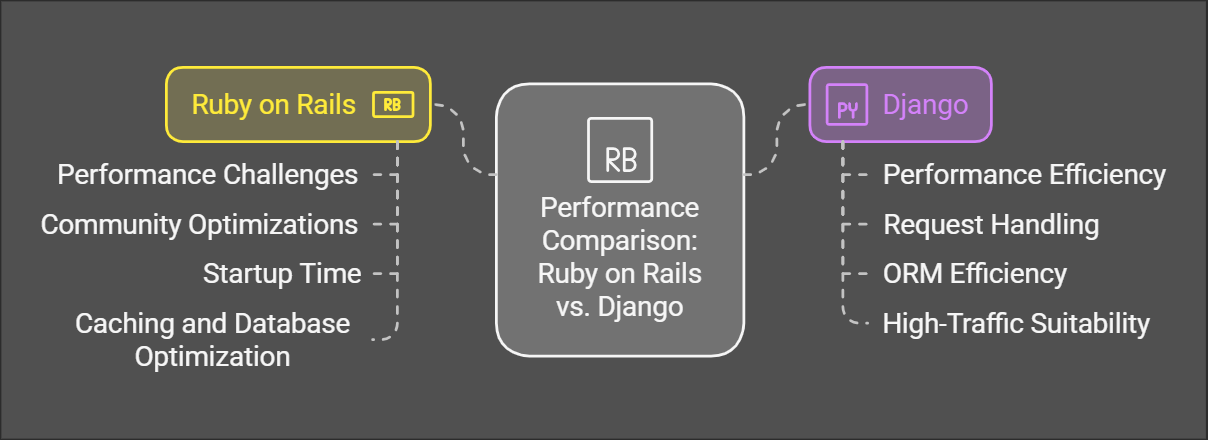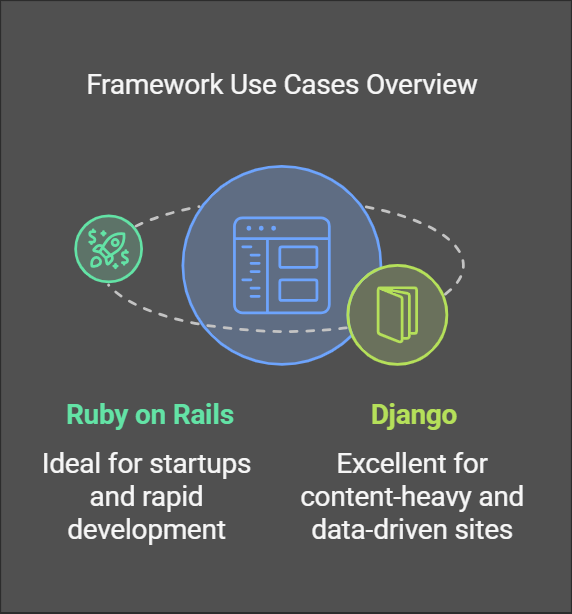Ruby on Rails V/S Django : Detailed Comparision
Introduction
Ruby on Rails (Rails):
A web application framework written in Ruby.
Emphasizes Convention over Configuration (CoC) and Don't Repeat Yourself (DRY) principles.
Django:
A web application framework written in Python.
Follows the "Batteries Included" philosophy, offering extensive built-in features for rapid development.
Framework Philosophy
Ruby on Rails (Rails):
Prioritizes Convention over Configuration (CoC) to minimize decisions developers need to make.
Follows Don't Repeat Yourself (DRY) principles to reduce redundancy in code.
Emphasizes productivity and simplicity, enabling developers to build applications quickly and efficiently.
Django:
Adheres to the "Batteries Included" philosophy, providing a comprehensive set of features out of the box.
Promotes reusable components and clean design to facilitate rapid development.
Focuses on reducing the amount of time developers spend on common web development tasks through its extensive built-in tools.
Language and Syntax
Ruby on Rails (Rails):
Uses Ruby, known for its elegant and readable syntax.
Focuses on making code intuitive and expressive, which can lead to faster development.
Encourages developers to write clean, maintainable code.
Django:
Uses Python, valued for its simplicity and readability.
Promotes writing clear and concise code, making it accessible to beginners.
Python's straightforward syntax helps developers quickly understand and implement features.
Performance and Speed

Ruby on Rails (Rails):
Can face performance challenges due to the dynamic nature of Ruby.
Has a strong community that continually works on optimizations and performance improvements.
Known for its startup time, which can be slower compared to other frameworks.
Active development and numerous gems (libraries) help mitigate performance issues.
Performance can be improved with proper caching and optimized database queries.
Suitable for rapid development but may require additional effort for scaling performance.
Django:
Generally offers better performance due to Python's efficiency and straightforward design.
Efficient request handling and lower startup time compared to Rails.
Provides built-in tools for caching and performance optimization.
Python's strong performance in data processing tasks benefits Django applications.
Django's ORM (Object-Relational Mapping) can handle complex queries efficiently.
Well-suited for high-traffic applications and content-heavy sites.
Performance can be enhanced further with proper use of Django's features and third-party packages.
Community and Ecosystem
Ruby on Rails:
Large, vibrant community of developers.
Extensive ecosystem with numerous gems (libraries).
Active participation leading to constant improvements and new features.
Frequent conferences, meetups, and events worldwide.
Strong support network for learning and collaboration.
Comprehensive documentation and learning resources available.
Django:
Active and engaged community.
Vast array of packages and extensions.
Welcoming nature and emphasis on documentation.
Numerous events, including DjangoCon and local meetups.
Strong focus on security and best practices.
Continuous contributions from developers worldwide.
Scalability
Ruby on Rails:
Scalable with proper architecture and design.
May require additional effort to optimize and manage scaling.
Uses horizontal scaling and caching to handle increased loads.
Performance optimizations through effective database management and code efficiency.
Suitable for growing startups with rapidly changing needs.
Examples: GitHub, Shopify, Airbnb.
Django:
Naturally scalable and well-suited for high-traffic sites.
Built-in tools for efficient request handling and database operations.
Supports horizontal scaling and caching strategies.
High-performance capabilities with optimized data processing.
Often praised for handling large-scale applications smoothly.
Examples: Instagram, Pinterest, Disqus.
Use Cases

Ruby on Rails:
Ideal for startups due to its rapid development capabilities.
Suited for projects requiring quick iterations and feature deployment.
Provides a strong foundation for building Minimum Viable Products (MVPs).
Often chosen for e-commerce platforms and social networking sites.
Great for applications that need to scale quickly with growing user bases.
Utilizes a rich ecosystem of gems to extend functionality easily.
Examples: GitHub, Shopify, Airbnb, Basecamp, SoundCloud.
Django:
Excellent for content-heavy sites requiring robust content management systems.
Well-suited for applications needing strong admin interfaces and backend support.
Ideal for news sites, blogs, and large-scale web applications.
Provides built-in security features, making it suitable for financial and government sites.
Often chosen for data-driven applications with complex data structures.
Supports high-traffic websites with efficient request handling and caching.
Examples: Instagram, Pinterest, Disqus, The Washington Post, Mozilla.
Frequently Asked Questions(FAQ's)
Conclusion
Both Ruby on Rails and Django are excellent choices for web development. Each framework has its own strengths and is suited to different types of projects:
Ruby on Rails: Best for rapid development, startups, and applications that require quick iterations and a large variety of ready-to-use libraries.
Django: Ideal for content-heavy sites, applications requiring strong security, and projects that benefit from Python's simplicity and readability.
The best framework for your project depends on your specific requirements, the expertise of your team, and your personal preferences. Both frameworks have proven track records and large, supportive communities that can help you build robust, scalable web
